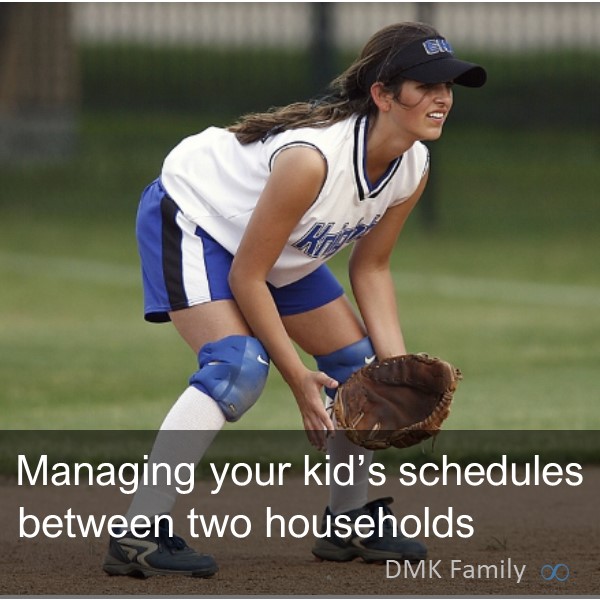Child custody schedules can be difficult on our kids and positively maddening for us. Alternating weeks and weekends, holidays and special occasions are confusing unless we plan our lives around these schedules. As it goes, many of us do. Everything is hinged on, "Do we have the kids this weekend, today or next holiday?".
While we get used to the routine, our child's schedules may be less forgiving. This means our schedule is not only revolving around our custody arrangement, but we must plan around the many schedules and activities for which our children are committed.
Regardless of the activity, the problems are the same. We need to keep up with each child's schedule and continue to keep good communication with the other co-parent in order to maintain an organized routine that our child depends upon.
What types of activities affect our kids schedules?
Sports, appointments, play dates, clubs, after school activities and extracurriculars, school events, birthday parties, homework and project due dates, field trips, general schedule modifications
What is the best way to keep each parent informed?
Each co-parenting relationship is going to vary based on the relationship between co-parents and each parent with the child. How we choose to inform each other regarding the consistent changes within our child's schedule should be something that is discussed and agreed upon prior to the commencement of the divorce. It may change occasionally based on recognition of communication errors that have caused friction or inconsistencies.
If you have a problem with:
"You didn't tell me about that." You may want to communicate via e-mail or text with a read receipt so that there is a written record of your communication.
"Why didn't you tell me she was going on a field trip today?" Give your former spouse your child's school's contact information so that he can verify he is a primary contact for school news, updates, emergencies and student progress related to your daughter. If not, he should add his contact information with the correct person at the school. If you want to help him with that, it's entirely dependent on you and your relationship. However, it is very important that both co-parents are listed as contacts with your child's school in the case of emergencies.
"I didn't agree our son could take on another after-school activity." Let the co-parent know you were unaware of his concern. Ask him if there are specific reasons why he feels the way he does. Explain why you don't feel it is something to be concerned about or, if you agree with him, arrange to tell your child the reason he will need to turn the opportunity down. Let the co-parent know that you respect his input on your child's commitments. It's best to address similar issues with each other, in advance to respect each other's input. Not everything can be resolved to amend a current commitment or concern. Your co-parenting process is a work-in-progress and will go through many changes. Be patient and open minded.
"I can't take time off work every two weeks to take her to the orthodontist." Try trading obligations to work with each other's schedules. You handle orthodontist visits and your co-parent agrees to take on a commitment outside of his/her work schedule regardless of your current custody arrangments. Otherwise, provide options to your co-parent regarding "parenting help" through sites like Care.com.
How to work with your ex-spouse as a co-parent
It is important to make reasonable agreements on raising your child. To do this, you will need to change your relationship. You are no longer two spouses, you are co-parents. You share a similar mission to raise your child separately, but together. See this person as your child's parent who has the same goals to see that your child has an excellent relationship with each parent. Your overall objective is to have a cohesive co-parenting relationship that your child will rely upon. You don't have to like or love your co-parent. But, you should try to respect his/her opinion in co-parenting matters as much as possible. You will have disagreements, but overall, if you make decisions based on the best interest of your child, the relationship will be successful and your child will have a stable parenting foundation.
This means you will need to develop excellent communications skills and maintain a high level of respect for your child's parent regardless of your feeling about this person as a spouse. It won't be easy immediately, but as emotions change and each of you heal following the end of your marital relationship, you will begin to find the most effective ways to raise your child.
How to keep your kid's schedules manageable
First and foremost, it is important to respect each other's input in your child's schedule. If one co-parent begins to participate less in your child's obligations it may cause the other to discontinue involving that co-parent in the child's normal activities and plans. This leads to frustration on both sides and eventually one parent taking on the majority of the responsibilities.
The better way to deal with this situation is to continue to involve and elicit the help of the other co-parent. Keep it formal and in writing via text or e-mail in order to verify you have continued to communicate the schedules to the co-parent to encourage his/her participation.
Don't get caught-up in over committing your child to various activities. This is especially true during your separation and immediately following your divorce. Your child is emotionally affected too. You and the other co-parent are still in the beginning stages of developing a good co-parenting plan.
Don't be afraid to remain consistent with your parenting skills and decision making even if your child pitches a fit. Your child's overall well being is what you ultimately want to provide. It's best to establish a reasonable limit of activities for each child in the beginning of the year so that each parent and child understands the expectations and maximum commitments possible.
In summary: Things to avoid regarding kid's schedules after separation and divorce
Don't over commit
Kid's are not just little people. They are inexperienced, immature and less educated individuals who can't always foresee the potential problems in being overcommitted. While it is a good idea to keep your child living an active lifestyle, over commitment, especially during difficult times can lead to problems with grades, behavior, anxiety, depression and sleep disturbances. Your child can quickly get overwhelmed which can lead to rifts between the co-parents that can effect the other children and on-going relationships within the family.
Don't make decisions without input from the other co-parent
Regardless of your legal custody arrangement, your children have two parents who have an established and on-going relationship with them. Respect for the other co-parent may not produce instant respect from him/her. However, eventually your continued communication will demonstrate an example of your new co-parenting role which leads to mutual respect that the other parent will likely follow. Ask for input, take advice and provide opinions to keep an interactive relationship to satisfy the mutual goals to provide the most nurturing and beneficial parenting model for your children.
Don't take on the majority of your child's commitments alone
You have a co-parent for a reason. It's important to develop an idea of how you both want to maintain schedules as early as possible in the co-parenting relationship in order to have less conflicts and surprises along the way. One parent may have the primary custody and be formally responsible for more tasks associated with your child's care. However, keeping the other parent involved is about keeping a balanced co-parent relationship for the benefit of your children.
Don't allow other parents to influence your decision
It doesn't matter what other parents or friends of the family do. Regardless how similar their situation is with you and your family, ultimately, you are the only parents who should make such decisions as they affect your child and families dynamic.
Disclaimer
The information provided by respective owner's ("we", "us" or "our) on Divorce Me Knot (referenced also as "DivorceMeKnot.com", "dmk", "DMK", "OurDMK.com", "OurDMK", "application" or "site") is for general informational purposes only and is subject to change with or without notice. All information on our site and application is provided in good faith, however we make no representation, guarantee or warranty of any kind, express or implied, regarding the accuracy, validity, adequacy, reliability, availability or completeness of any information on the site or application.
The information in articles and all content on this site should not be considered psychological or behavioral health therapy, counseling or legal, financial, real estate, mortgage, insurance or professional advice. It should not be used in place of professional advice from a licensed professional or credentialed expert. Providers of content on this site, herein known as "Contributors" (inclusive of, but not limited to writers, bloggers, editors, employees, developers, graphic designers, advertisers, partners, affiliates, references, experts, professionals and site owners) are not legally liable for any misinformation, errors or omissions. Names, details and images may have been changed in the content of this site.
Under no circumstances should DMK and/or it's Contributors have any liability to users of the site for any loss or damage incurred to users as a result of the use of this site or application or reliance of any information provided on the site or application. Use of the site or application and reliance on any information from the sight or application is solely at the user's own risk.
For complete site disclaimers review "Disclaimers" on this site or click the link below.
Read Complete Site Disclaimers Here




 How to resolve AdBlock issue?
How to resolve AdBlock issue?